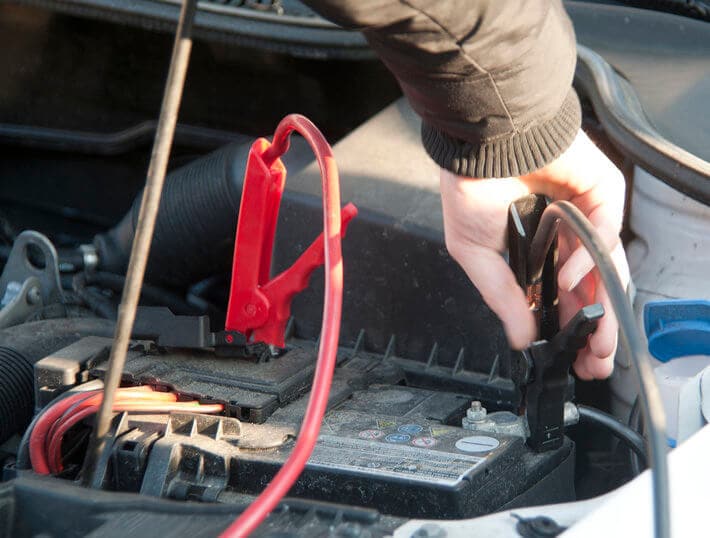Last Updated on April 17, 2023 by Ryan
Yes, corrosion can drain a car battery. Corrosion occurs when the metal of the battery terminals reacts with oxygen or other substances in the air, resulting in a discharge current that drains power from the battery. This process is called self-discharge and it causes an ongoing loss of charge even when your car isn’t running.
The more severe the corrosion, the greater will be its effect on draining your car’s battery. Corroded connections increase electrical resistance which reduces voltage at crucial points and further weakens your vehicle’s electrical system. In extreme cases, this can lead to complete failure of your vehicle’s starter motor or alternator as well as leaving you stranded with no way to start your engine due to a dead battery caused by corrosion.
Corrosion on your car battery terminals can cause a drain on the battery, leading to difficulties starting your engine or draining power from the vehicle. Corrosion is caused by chemical reactions with metal and other materials, which leads to a build-up of oxidation that can interfere with the electrical connections in your car’s wiring system. If you notice corrosion on your battery or it seems like it’s not holding its charge as well as usual, make sure to clean off any debris and check if there are signs of damage before seeking out further repairs.
Battery Corrosion Causing a car not to Start Properly -How to Fix the Issue and Clean the Corrosion
Should I Replace My Car Battery If There is Corrosion?
Yes, it is recommended that you replace your car battery if there is corrosion present. Corrosion can cause major damage to the electrical components in your vehicle and even lead to a fire hazard. If left unchecked, corrosion can also shorten the lifespan of your car battery and reduce its performance.
Therefore, for safety reasons and to ensure peak performance, it is important that you replace any corroded batteries as soon as possible.
Can Corrosion Ruin a Car Battery?
Yes, corrosion can ruin a car battery. Corrosion occurs when the electric current of the battery is exposed to oxygen and moisture. This causes chemical reactions that break down the metal components of the battery, eventually weakening its structure and leading to electrical failure.
Corrosion can also cause permanent damage by eating away at terminals, cables, posts and other parts of the car’s electrical system. Additionally, it can lead to an accumulation of dirt or debris in between connections that will further reduce power output from the battery. Therefore, regularly inspecting your vehicle’s battery for signs of corrosion should be part of any routine maintenance schedule in order to ensure optimal performance over time.
Will Corrosion Keep a Car from Starting?
The answer to this question is yes, corrosion can keep a car from starting. Corrosion occurs when metal surfaces come in contact with oxygen and moisture, leading to the formation of rust. Rust can accumulate on key components such as the battery terminals or starter motor, preventing electrical current from flowing through those parts and stopping your engine from turning over.
If left unchecked, corrosion can even cause irreparable damage to these critical parts, rendering them useless and preventing your car from ever starting again. To prevent corrosion and ensure that your vehicle starts reliably every time you turn the key, it’s important to inspect all exposed metal regularly for signs of rust buildup and take preventive measures like cleaning corroded areas with baking soda or using a protective coating like WD-40® Multi-Use Product before any noticeable damage appears.

Credit: www.firestonecompleteautocare.com
Corrosion on Battery Terminal And Car Won’T Start
Corrosion on the battery terminals can cause your car to fail to start. This corrosion is caused by a buildup of sulfuric acid, which can form when the battery is overcharged or if it has been exposed to moisture. Corrosion buildup on the terminal will create an insulating barrier between the battery and starter, preventing power from reaching it.
To prevent this issue, regularly check your vehicle’s battery terminals for signs of corrosion and clean them off with baking soda and water before starting your engine.
What Can Drain a Car Battery When the Car is Off?
The most common cause of a car battery draining when the car is off is something called “parasitic drain.” This occurs when electrical components in your vehicle draw power from the battery even when the engine isn’t running. Some examples of these components are clocks, alarm systems, ECUs (Engine Control Units), and even interior lights that are left on.
It’s important to be aware of these drains so you can make sure your car stays charged and ready to go!
What Can Drain a Car Battery Instantly
One of the most common causes of a car battery draining instantly is when headlights, interior lights, or other electrical components are left on while the engine is off. This can rapidly drain your battery and leave you stranded if not attended to quickly. Other potential culprits include faulty alternators, bad connections in the wiring system, cold weather, and old age.
Conclusion
In conclusion, corrosion is a major factor in draining car batteries. It can occur due to exposure to water or other chemicals and cause damage to the battery terminals and connections. To prevent this from happening, it is important to regularly clean and inspect the battery components as well as ensure that they are properly sealed against moisture intrusion.
Taking these steps will help protect your car’s battery and keep you safe on the road.



